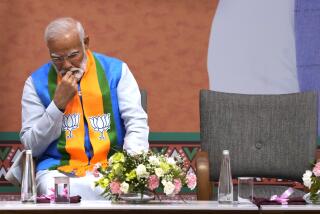India: From Nehrus’ Rule to Coalitions : Elections: The defeat of Rajiv Gandhi’s Congress Party means that running the world’s largest democracy won’t be all in the family anymore.
- Share via
NEW DELHI — A revolution by ballot has occurred in India. Since its birth 42 years ago, the world’s largest democracy has been ruled mostly by the Congress Party under the leadership of the Nehrus. Now the Indian electorate has voted to embark upon an experiment in coalition government.
This is a cruel irony for Rajiv Gandhi. He took the Congress Party to its zenith of power five years ago; its majority in Parliament was an intimidating 414 seats. Today, he has brought it to its nadir. Of the 525 seats contested in the election, Congress won only 192, a majority of them in four southern states. As such, the party is little more than a regional force. It wisely decided, despite the temptations of its leader, not to make a claim to form the new government. Gandhi will now take his seat, gracefully one hopes, on the opposition benches.
A poet and painter--who is also a gritty politician--will now head the government. Vishwanath Pratap Singh’s National Front coalition won 143 seats, the bulk of them in the Hindu heartland. This poor and populous part of the country has always held a key to the doors of power. Win Uttar Pradesh and you win Delhi. Though far short of the necessary majority to form a government, the National Front--particularly its main member, Singh’s Janata Dal Party-- commands nationwide support. Enough support to let the new prime minister take on the challenging task of forming a minority government, with outside support from the Bhartiya Janata Party and the Communists.
The election was India’s bloodiest and dirtiest since becoming a democracy. At least 102 people died. The political discourse was outright inflammatory. Some leaders of Janata Dal, for example, called Gandhi a common thief who should be jailed. In response, the former prime minister smeared his opponents as scorpions and traitors. (How much we have fallen from our chosen Westminster model.)
The most distressing aspect of the voting was the rigging of results. Armed with huge sums of money and enormous muscle power, the Congress Party practiced it flagrantly. Even Gandhi was implicated, since his henchmen resorted to rigging his own contest. A courageous election commission had to order a recount in part of Gandhi’s own district.
Honesty became the election’s central motif; the contest was virtually a referendum on one issue: Are Gandhi and his government corrupt?
In 1986, the government contracted with Bofors of Sweden to buy howitzers. Documents subsequently published in the Indian press disclosed that the deal involved kickbacks, with Gandhi among those on the receiving end.
Boforsgate, as the scandal came to be known, contributed to Gandhi’s overwhelming defeat, as did Singh’s brilliant exploitation of it as a campaign issue. But the new prime minister also owes victory to two newspapers, Indian Express and Hindu, that braved government threats and intimidation to expose Gandhi’s activities. Long before reaching the hustings, Gandhi stood condemned in the eyes of the people.
The Congress Party did well in India’s southern states only because it appeared less corrupt there than the opposition parties. In the states of Andhra and Karnataka, local equivalents of Rajiv Gandhi were flayed at the polls. The Telugu Dessam Party, which rules Andhra, lost all its seats in Parliament, as did the Janata Party in Karnataka. Charges of malfeasance and nepotism put the electorate in a punishing mood.
The Congress Party setback in the Hindi heartland and in the industrially advanced western states of Gujrat and Maharashtra stemmed from its duplicitous policy on religious issues that have strained Hindu-Muslim relations. Speaking terrible Hindu, Gandhi extolled Lord Rama (the supreme being in human form) in one speech. To devout Hindus, his words came across as hollow; they angered Muslims. Then, on the eve of the election, 1,000 people were killed in Bhagalpur and Muslims suspected that the Congress Party was an accessory.
Despite its disturbing rhetoric and bloodshed, the election marked a maturing of this poor, underdeveloped democracy. The people, with their votes, now insist that the newly elected leaders strengthen India’s democratic institutions. Singh seems ready to respond: He endorses public financing of elections, freedom of information and autonomy for radio and television. He also wants to make press freedom a constitutional right.
For a country as socially and culturally diverse as India to have been ruled by a single political party and one family for so long was a gross aberration. A coalition government will better reflect Indian society. And since the electorate is basically conservative, only a coalition giving the advantage to centrist parties will do. Extreme right or left has never appealed to the Indian people. Singh enjoys the support of parties that are sworn enemies, but they, along with his National Front, are hanging together out of a fear that the Congress Party under Gandhi may return.
Gandhi is a tragic man, the tragedy of his own making. Indian voters would have overlooked incompetence and ostentation. They could not ignore moral guilt. Once the king is morally discredited, his followers desert him. The Congress Party split in 1978 after Indira Gandhi had lost power a year earlier; it is certain to do so again.
India is undergoing a difficult transition from one-party, one-family dominance to a two- or three-party system. Singh faces an enormous challenge, trying to put the political pieces back together.
More to Read
Sign up for Essential California
The most important California stories and recommendations in your inbox every morning.
You may occasionally receive promotional content from the Los Angeles Times.













